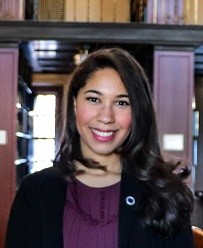.jpg)
Virtual American Cultures Merit Badge
What: The American Cultures Merit Badge will explore traditions, and customs that have influenced what is known today as the American culture. Topics of discussion will include:
- United States population and demographic information provided by the Census;
- Special holidays;
- Celebrations;
- Musical influences from other cultures;
- Historical events that have shaped population changes in the United States; and
- It will explore how the American culture influences the world.
Meet your Counselor - Dorca M. Paulino works for the Rhode Island Supreme Court, where she is leading the Judiciary's diversity and inclusion efforts. In 2017, Ms. Paulino became the first diversity officer appointed to serve in a State's Judiciary in the New England region. Ms. Paulino was hired by Chief Justice Paul A. Suttell to manage diversity and inclusion activities across the Supreme Court, Superior Court, District Court, Family Court, Workers’ Compensation Court, and the Rhode Island Traffic Tribunal. In addition to managing the Judiciary’s Diversity Office, Ms. Paulino serves as the Equal Employment Opportunity Coordinator and works with the Chief Judges and Administrators of each court to serve employees, to support recruitment efforts, and to ensure compliance of equal employment opportunity and affirmative action laws and regulations.
Prior to working for the Judiciary, Ms. Paulino worked in the corporate sector in the areas of human resources, accounting and sales for subcontracting companies that followed minority participation policies established by local 94, local 2168, local 6, and local 17. Ms. Paulino is a Henry Toll Fellow, and the recipient of the American Society of Public Administration Affirmative Action/Equal Opportunity Exemplary Practices Award. She was born and raised in the Dominican Republic, where she lived until the fall of 2002. Her family moved and settled in Rhode Island, where she attended high school and college, completing her Psychology and Accounting Studies from Rhode Island College and a Master of Public Administration from Roger Williams University School of Justice Studies. Ms. Paulino volunteers her time as a mentor, board member, and serves on various committees.

WHO: Open to all Scouts BSA members
HOW: This Merit Badge will be taught in a virtual classroom. The class has a capacity of 20 Scouts. Small classroom size provides all students with the opportunity to share and interact with the counselors and other Scouts. Scouts should be prepared to be challenged and to join the conversation! Participants who do not engage with the class may not receive credit for the badge. Scouts must be prompt for all badge sessions. Late participants may not receive credit for all requirements.
Before beginning work on any merit badge, scouts are to have a discussion with their unit leader regarding the specific badge and counselor.
WHEN: This class will be held virtually over two sessions:
June 16, 2020 10:00AM-11:00AM
June 18, 2020 10:00AM-11:00AM
Scouts must attend both sessions to complete the offered requirements.
After registering, Scouts will receive a link and login information via email the day class is scheduled. Scouts will also receive instructor details that can be used to connect to the counselor on Scoutbook. This assures that completed requirements are easily recorded.
PREREQUISITES: Students are not required to complete the prerequisites prior to attending the workshop.
Suggested supplies/prep-work for students:
Choose three groups that have different racial, cultural, national or ethnic backgrounds, one of which comes from your own background. Use these groups to meet requirements for 1, 2, and 3.
- Read about a festival, celebration, or tradition identified in one of the groups. Report what you see.
- Tell about some differences between the religious and social customs of the three groups. Tell about some ideas or ways of doing things that are similar in the three groups.
- Tell about a contribution made to our country by three different people, each from a different racial, ethnic, or religious background.
Homework
- Access a virtual library or virtual museum exhibit to see a program featuring one group’s traditions. Report on what you see and learn.
- Give a talk to your Scout unit or class at school about how people from different groups have gotten along together. Lead a discussion on what can be done to help various groups understand one another.

.png)